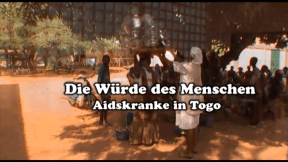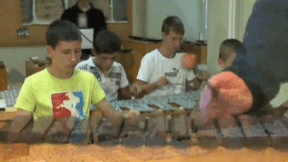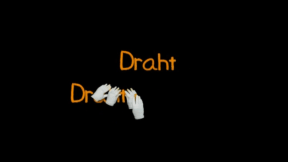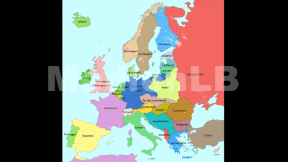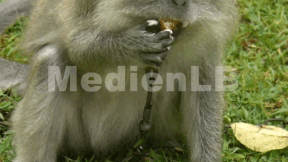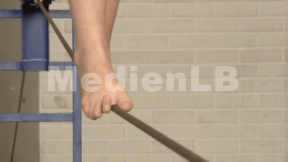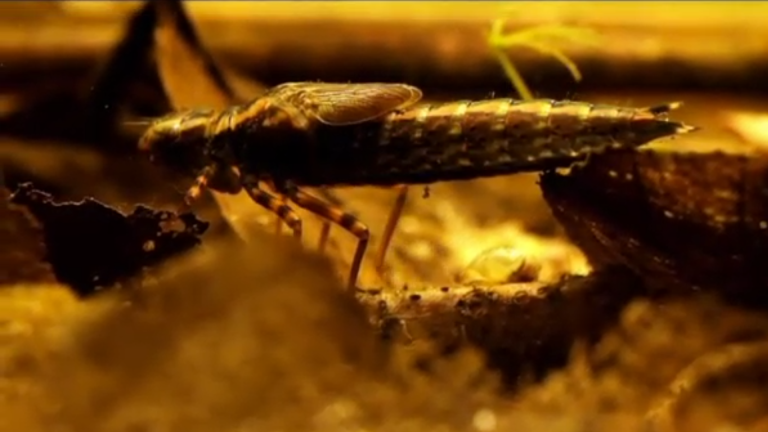Suche:
- # Artistry
- # Biology
- # Chemistry
- # Ecological
- # Economy
- # English
- # Foreign Language
- # Geography
- # German
- # Health
- # History
- # Informatik
- # Latin
- # Mathematics
- # Media Education
- # Music
- # Physics
- # Politics / Civics
- # Preschool
- # Primary School
- # Religion
- # Society
- # Sports
- # Technology
- # Training of Teachers
- # Vocational Education
Human Dignity
This is Albertine. She is seven years old. Three years ago, she lost her mother and has lived with her grandmother ever since, her father has left them. Every noon she comes to have lunch in the ward. The girl seems to feel her strength ebbing away and has decided not to talk anymore. The children at this stage believe that the grown-ups can prevent death but see that they're not doing so. Thus, they seal themselves off and retreat into their own world. And when this happens, Sister Marie Stella and her team prepare the children for death, just as they do with the grown-ups. Albertine was allowed to chose a dress from the dressmakers for the Christmas celebration.
Learn moreMusical Instruments III
Who does not know them - the Orff Instruments? Already at the age of a toddler, you come in contact with them. Rattles and other noisy toys are to be found in almost every nursery and also the glockenspiel is an instrument found frequently there. But where do these Orff instruments come from? And what has given them their names? Carl Orff, the Munich-born musical teacher and composer, greatly influenced the national and international music world with his works. The Orff instruments were named after him and music pedagogy is no longer imaginable without them. But who was Carl Orff? The first part of the film shows Carl Orff's life from childhood until death. Subsequently, Carl Orff's works are covered, with a focus on "Carmina Burana“. The last part provides us with a detailed overview of the Orff instruments. The qualities of the instruments and their sounds are shown as well as the ways they are played. Together with the comprehensive and innovative accompanying material, the film is highly suitable for classroom use.
Learn moreWire
At first glance, wire seems to be a nondescript, rather boring material, too humdrum to be bothered with. The intensive occupation with wire in the film as well as in the accompanying material, however, makes obvious what significance wire actually has in our society. It is truly indispensable! Through the film, children get acquainted with the differences between modern and historic wire manufacturing. Moreover, they see how a bicycle is made and thus learn why bicycles are also called "wire donkeys".
Learn moreKunst der Moderne
Von der klassischen Moderne zur Gegenwartskunst. Was zeichnet diese Kunst aus? Um Kunst zu verstehen, muss man zunächst einen Zugang zu ihr finden, vielen Menschen fällt dies nicht leicht. Der Kuratorin Annika Schoemann ist unter anderem zuständig für die öffentliche Kunstvermittlung. Sie nimmt uns mit in zwei Museen für Moderne Kunst, in Galerien und zu aktiven Künstlern.
Learn moreKreislauf der Fotosynthese
Die Fotosynthese ist ein fundamentaler biochemischer Prozess, der von Pflanzen und Algen betrieben wird. In dem Film wird dieser Prozess in Grafiken und Realbildern detailliert und anschaulich dargestellt. Auf die Entdeckung durch Joseph Priestley und sein berühmtes Experiment wird ebenso eingegangen wie auf die Bedeutung der Fotosynthese für die Ökosysteme der Erde.
Learn moreGenetic Code Sun
Life on Earth assumes a large variety of shapes. There is plant life and animal life. Protozoa live alongside human beings, ants alongside fish and elephants, a blowball alongside a cactus.
Learn moreHecht
Der Hecht ist Fisch des Jahres 2016. Er ist einer unserer größten heimischen Raubfische. Sein Maul ist mit messerscharfen Zähnen gespickt.
Learn moreSharks
The enormous size of the jaws and the frightening teeth of sharks have always attracted people's interest. Horrifying news of attacks on humans did the rest – "Jaws“: Steven Spielberg turned this best seller by Peter Benchley into a world-famous film. The story, published in 1974, is based on true events. In the 1960s, sharks were often spotted off America's coasts and the press was generous with reports often so scary that fear was fuelled. One day, as a shark stranded, it was a unique opportunity for the crowd of perplexed swimmers to observe the supposedly terrible monster at close range. Watching living sharks from special protective cages is a popular albeit expensive tourist attraction. It is an unforgettable experience to watch and photograph a shark swimming freely and gliding gracefully.
Learn moreBirds
This DVD from the Vertebrates series comprehensively introduces birds by means of various examples of indigenous, tropical and polar bird species. Among other things, it provides information on typical bird characteristics such as skeleton and bone structure, structure and function of the beak and feathers as well as the principle of light-weightness. Impressive close-ups of prepared bird bones as well as of a feather’s vane serve to illustrate these aspects. The adaptability of birds to the environments of air, land and water as well as to different kinds of food are shown by means of the examples of typical representatives of the species such as eagle and falcon, emu, duck, moorhen and kingfisher. Here, the pupils also learn about the relation between diet and shape of beak. The reproduction and breeding of birds is illustrated with impressive outdoor pictures of courtship and nest-building with different bird species, the hatching of a chick, the raising of grey herons up to the squabs’ first attempts at flying. Furthermore, the menu includes additional pictures as well as a tabular list of the different breeding times of altricial and precocial birds. Thus, this DVD offers flexibility and variety in the classroom and is especially suited for interactive learning.
Learn moreEvolution
Of all mammals existing today, the primates have the oldest phylogenetic tree. This film shows on the basis of extant species of the order of primates, which we humans also belong to, the phylogenetic tendencies in evolution from the treeshrew to prosimians, monkeys and apes to the genus homo. Special emphasis is laid on the visible outward characteristics of the skull and its sense organs, changes in the position of the spinal column as well as the development of extremities and their adaptation to various habitats. Changes in the anatomy of the skull, the development of the eye socket and also the shifting of the eyes from the sides to the front position, the dental structure and development of the jaw bones and the changing proportions of the mandible skeleton and the brain case are demonstrated on genuine skulls. The film analyses in detail the evolutionary tendencies of primates and convincingly answers the question on the origins of their development.
Learn moreEcosystem Lake
Lakes are stagnant waters that look quite peaceful to us. But the quiet is deceptive: above and below the water surface, life is anything but peaceful. Phytoplankton and zooplankton are eaten by small predators such as polyps or hydrachnidiae. Toebiters, dragonfly and beetle larvae are food for the water scorpion. As every animal feeds on different prey and in turn is eaten by various predators, a food web is created. The amount and variety of the lake inhabitants depends on the concentration of nutrients. In clear lakes, aquatic plants may spread down to a depth of 10 metres. Different zones with particular plant species are clearly visible. Also animals above the water profit from the rich underwater life, for example the waterfowl. Ever since the lake was formed, wind and waves have been carrying dead plants and animals to the shore, where they have sunk down and decomposed. At the same speed at which the lakeside grows, the water surface of the lake shrinks. With its extensive additional material the didactic DVD is ideally suited for use in the classroom.
Learn more




